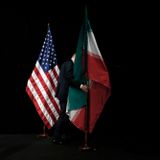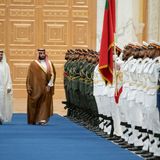RECENT ARTICLES

How a U.S.-Iran Deal Helps Red States
An expert's point of view on a current event.Three months into his term, U.S. President Joe Biden’s promise to reenter the Iran nuclear deal remains unfulfilled. Since he’s concerned about Republican opposition in Congress, Biden hasn’t made a swift return to the 2015 deal, known as the Joint Comprehensive Plan of Action (JCPOA), and has instead sought to assuage hawkish Republicans by squeezing Iran for future concessions before Washington reenters the agreement.Yet Biden’s reasoning is flawed. It makes sense to neutralize GOP opposition to the nuclear deal, but that won’t be achieved by...…An expert's point of view on a current event.Three months into his term, U.S. President Joe Biden’s promise to reenter the Iran nuclear deal remains unfulfilled. Since he’s concerned about Republican opposition in Congress, Biden hasn’t made a swift return to the 2015 deal, known as the Joint Comprehensive Plan of Action (JCPOA), and has instead sought to assuage hawkish Republicans by squeezing Iran for future concessions before Washington reenters the agreement.Yet Biden’s reasoning is flawed. It makes sense to neutralize GOP opposition to the nuclear deal, but that won’t be achieved by...WW…

The Real Regional Problem With the Iran Deal
As U.S. President Joe Biden explores returning to the Iran nuclear deal, Saudi Arabia and the United Arab Emirates (UAE)—two of only three countries in the world that opposed the agreement—insist that they must be included in future negotiations over its fate. Their inclusion, representatives of the two countries argue, would rectify the agreement’s supposed flaw: its failure to rein in Tehran’s regional policies.But in truth, Riyadh and Abu Dhabi have less interest in strengthening the nuclear deal than in sustaining the enmity between the United States and Iran. When the original deal was...…As U.S. President Joe Biden explores returning to the Iran nuclear deal, Saudi Arabia and the United Arab Emirates (UAE)—two of only three countries in the world that opposed the agreement—insist that they must be included in future negotiations over its fate. Their inclusion, representatives of the two countries argue, would rectify the agreement’s supposed flaw: its failure to rein in Tehran’s regional policies.But in truth, Riyadh and Abu Dhabi have less interest in strengthening the nuclear deal than in sustaining the enmity between the United States and Iran. When the original deal was...WW…
- Total 2 items
- 1